IChemE Matters – December 2023/January 2024
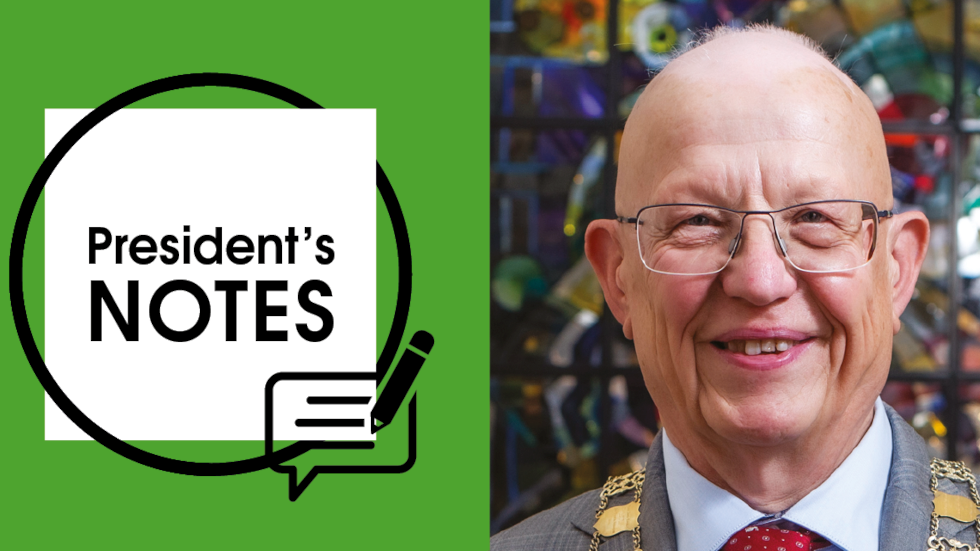
Delivering improvements and innovations
Nigel Hirst, IChemE president
ONE of my priorities for 2023 has been to significantly improve your membership experience and support your professional development and continuous learning, so I’m delighted to welcome Rachel Bibby into the new role of director of member experience and professional learning. Rachel’s proven track record in STEM sector strategic leadership and business development is underpinned by a PhD in microbiology and biochemistry, and I know she’s committed to driving our continued efforts to innovate and adapt for the benefit of all members. We’re also in the process of appointing a new role of head of policy and impact – look out for an update next issue.
Community is at the core of IChemE, and when I took office as president, I talked about my strong commitment to launching a new global digital community, so I was very excited to have a recent sneak preview of IChemE Connect. Designed to be a hub of knowledge, discussion, and collaboration, IChemE Connect is a place where all members can engage in conversation, interact on topics, ask questions, provide and receive support and mentoring provision, and share views and experiences. IChemE Connect will soft launch in December to a group of around 100 member volunteers to ensure it runs smoothly, with the main member launch taking place early in 2024.
A recent highlight for me has been hosting a lunch for 16 IChemE past presidents in the House of Lords. CEO Yvonne Baker and deputy president Mark Apsey joined me for this hugely interesting and motivating event. There were many topics of conversation going around the table, but with an overarching theme of ensuring IChemE is optimally configured to meet future challenges, as well as how we can best enable the institution to be “the voice” for our profession.
As I get ready to submit this to the editorial team, I’m looking forward to the official launch of our ITN Business programme, Engineering a Sustainable World: www.icheme.org/engineering-a-sustainable-world/
I always welcome any feedback, and value any input or ideas you would like to share – you can contact me at president@icheme.org
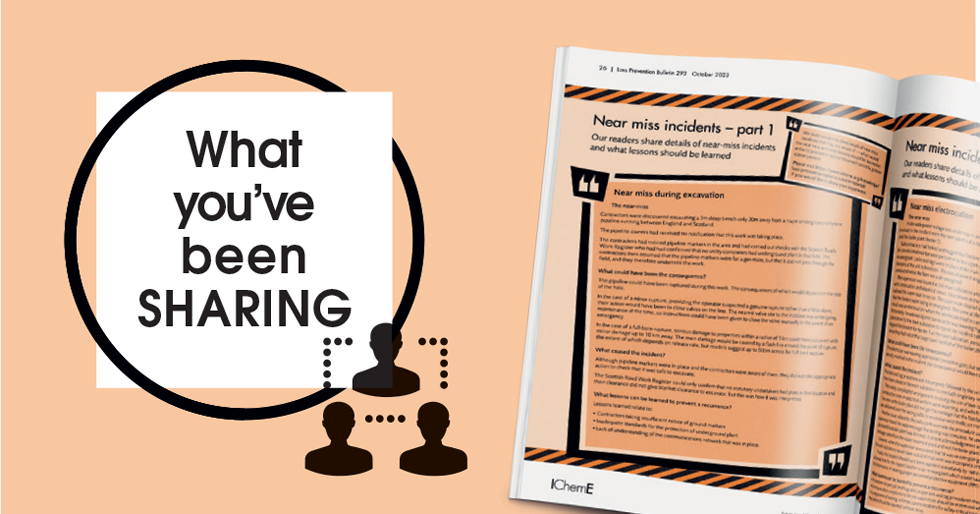
Near-misses
The Loss Prevention Bulletin, which members have free access to online through the IChemE website, has launched a new series where readers share near-misses. The first was published in issue 293 and shares the details of how contractors excavating close to an underground ethylene pipeline narrowly avoided a rupture which could have had catastrophic consequences for local communities. Tracey Donaldson, editor of LPB, said: “We have created a near-miss template for engineers to fill in and help share their lessons. The information can be published without naming the author or the plant and location involved. The important thing here is to help the community learn from one another and prevent recurrences that could lead to greater and tragic consequences.”
Download and fill in the template here: https://bit.ly/47xKZfo
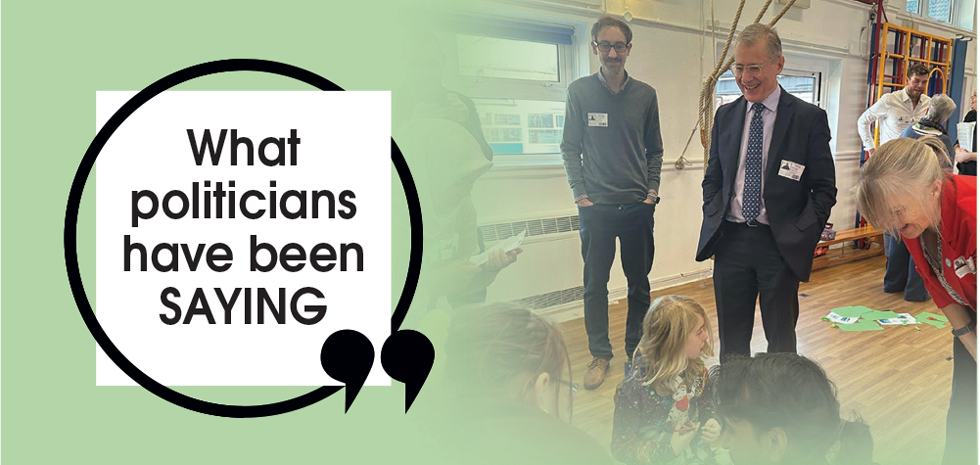
Mark Pawsey, MP for Rugby, attended a schools outreach event hosted by IChemE and its volunteers at a local school to help children develop their engineering skills. The event used IChemE’s new DiscoverChemEng classroom resources and involved building models to explore the efficiency of different types of turbine blades.
Pawsey, who sits on the select committee scrutinising the work of the Department for Energy Security and Net Zero, said: “It’s great to see initiatives like DiscoverChemEng offering youngsters from all backgrounds the opportunity to develop the strong STEM skills required for an engineering career. This is because it is crucial to ensure that we are training the future workforce the UK needs to support climate adaptation measures, develop innovative new green technologies, and deliver energy security for the UK.”
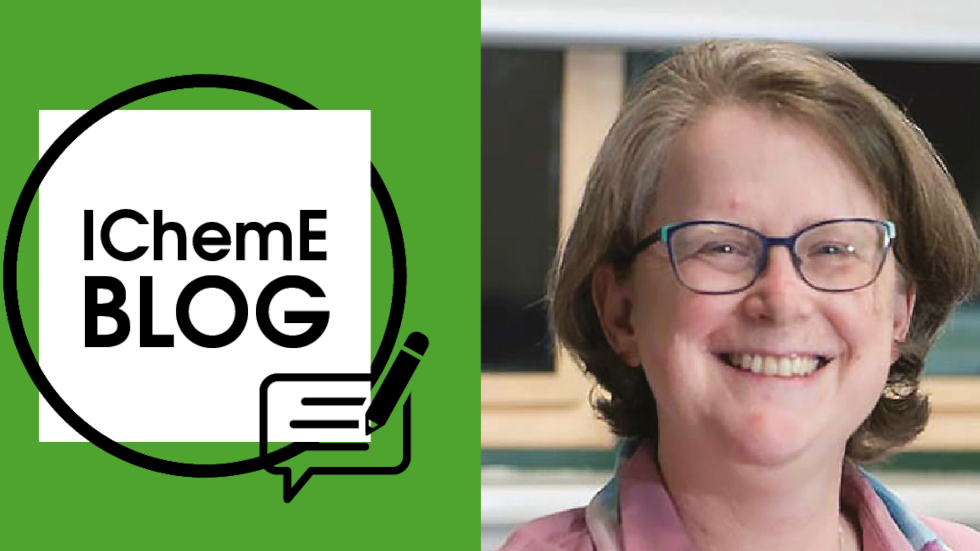
Knowledge groups getting their priorities right
Alexandra Meldrum, vice-president of IChemE’s Learned Society
I’M REALLY keen that IChemE be recognised as a trusted, vibrant professional body, with members who use knowledge and expertise to materially impact the major challenges facing society. Under the new IChemE Strategy 28+ for Engineering a Sustainable World, the strategic goals are supporting a vibrant and thriving profession and serving society by collaborating with others.
In October, after years of entirely virtual meetings, members of the Learned Society Committee (LSC) gathered in Rugby – the first time the LSC had met at IChemE’s global headquarters. We discussed how chemical and process engineers can provide leadership and solutions as our global society faces myriad challenges and opportunities, often interconnected. The networking, presentations and meetings over two days were very important for developing plans on how we could contribute demonstrably to the UN Sustainable Development Goals (SDGs) over the coming year.
We looked at specific projects and outputs aligned with our recently rolled out seven Priority Topics, improvements to processes for managing Learned Society projects, and sharing experiences for supporting our international technical and knowledge groups.
The Priority Topics include eight of the UN’s 17 Sustainable Development Goals. The topics are based on areas where chemical and process engineers play significant roles currently and areas where they are expected to do so in the future.
The seven Priority Topics are: Energy and Climate Action; Water and Sanitation; Food, Health and Well-being; Responsible Production, Innovation and Industry; Quality Education, including Lifelong Learning; Process Safety, including Major Hazards Management; and Digitalisation, including Cyber Security.
We have a range of IChemE groups engaged in creating and sharing knowledge – special interest groups, communities of practice, technical advisory groups, member groups, editorial boards, and others – and they have rallied around the seven new Priority Topics. At a November meeting of the Learned Society Forum, we found that most groups already create and share knowledge on one or more of them, and there are exciting opportunities for further collaboration to expand this knowledge sharing between groups and members.
Information about the Priority Topics, and activities and outputs linked to them, can be found at www.icheme.org/priority-topics
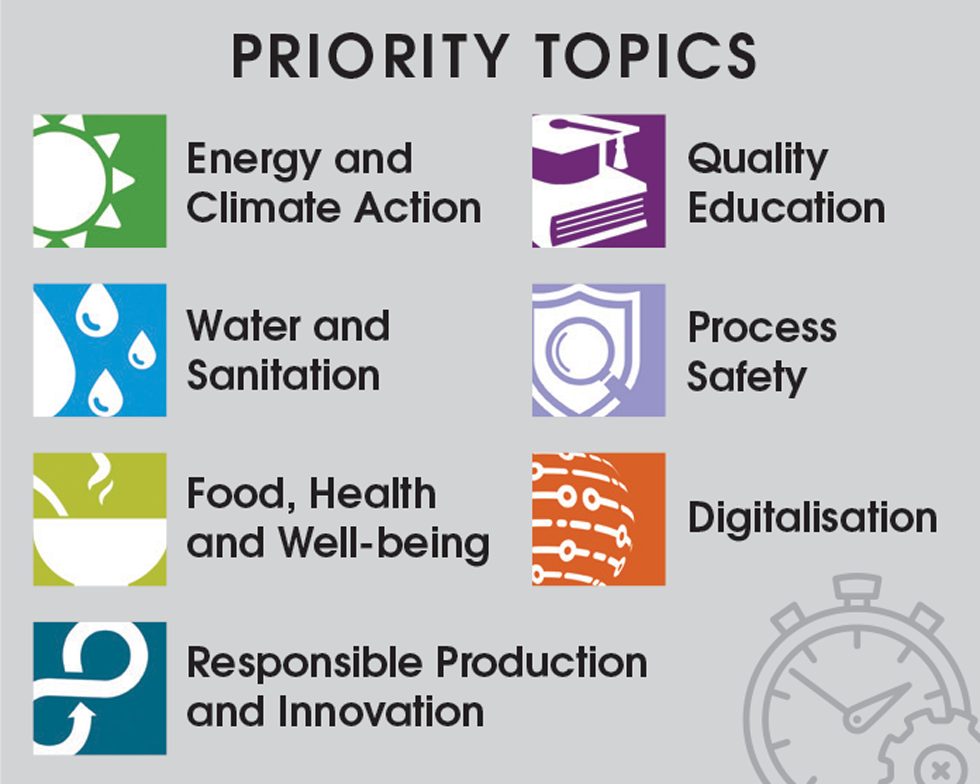
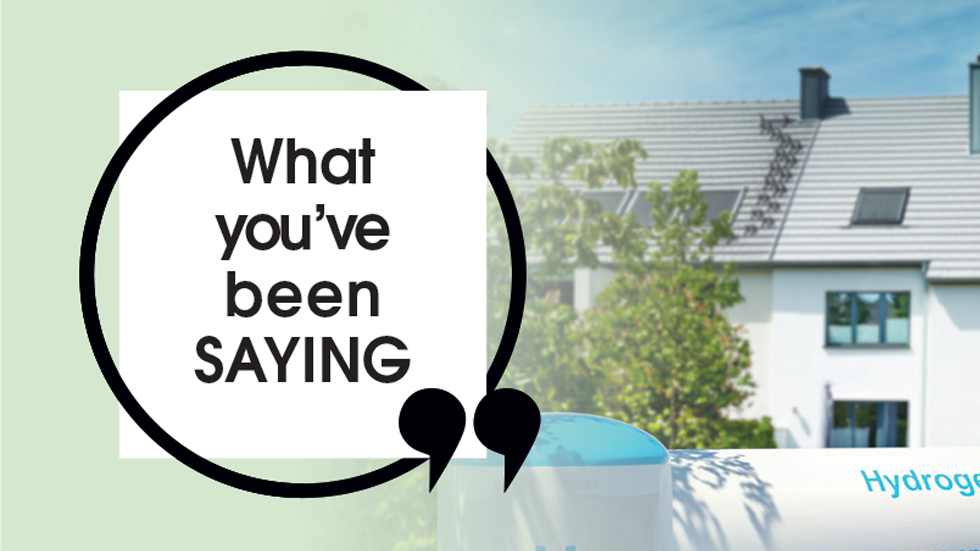
Hydrogen in the home?
The UK’s National Infrastructure Commission (NIC) has advised the UK government to abandon plans to use hydrogen boilers to heat homes. It follows the collapse of the hydrogen heat trials in Whitby in the wake of fierce public opposition. In its five-year review, the NIC wrote: “The Commission’s analysis demonstrates that there is no public policy case for hydrogen to be used to heat individual buildings. It should be ruled out as an option to enable an exclusive focus on switching to electrified heat.” It explained: “Heat pumps and heat networks are the solution. They are highly efficient, available now and being deployed rapidly in other countries.”
“A domestic hydrogen boiler installation in a kitchen cupboard, dependent only on natural ventilation, infrequently maintained by sometimes unqualified personnel, is literally an accident waiting to happen. Safe use of hydrogen will be an essential component of decarbonising many industries and applications where there is no alternative, and this is where our efforts should be concentrated.” Richard Boocock
“Why would we not choose a low cost, inherently low risk technology over an expensive high risk one?” Alistair Wasey
“It’s simply a commercial vehicle for fossil fuel producers to monetise natural gas for financial benefit alone. It’s energy nonsense.” Alan Shelbourne
“It doesn’t make much sense to use renewable electricity to produce hydrogen to then burn in a boiler when you could simply use that electricity to directly run a heat pump with a COP of 3+.” Nick Southam
“Reliance on electricity with increased storm frequency and intensity is a concern, though. We will need a robust grid. And strong baseload.” Phillip Evans
“There is no silver bullet to enable the energy transition, so we should move forward with all the possible solutions for heat supply at homes: hydrogen, electrification, heat pumps, energy efficiency and others. This diversification also ensures availability.” Isidro Garnica Tapia
“Using the gas grid with hydrogen…avoids putting all reliance on just one in-home source of energy. It will eventually boost the possibility for the use of hydrogen in vehicles. Furthermore, replacing gas burners in houses with hydrogen fuel-cells will provide both domestic heating and domestic electricity.” John Dodds
“Hydrogen is difficult to contain; I am still learning about it for industrial use. Hydrogen needs to be “green”; does the UK have plans for enough green hydrogen, not derived from or using fossil fuels? Heat pumps help but need green electricity to be green. No good if the refrigerant leaks and has a significant global warming potential.” Gerard Lardner
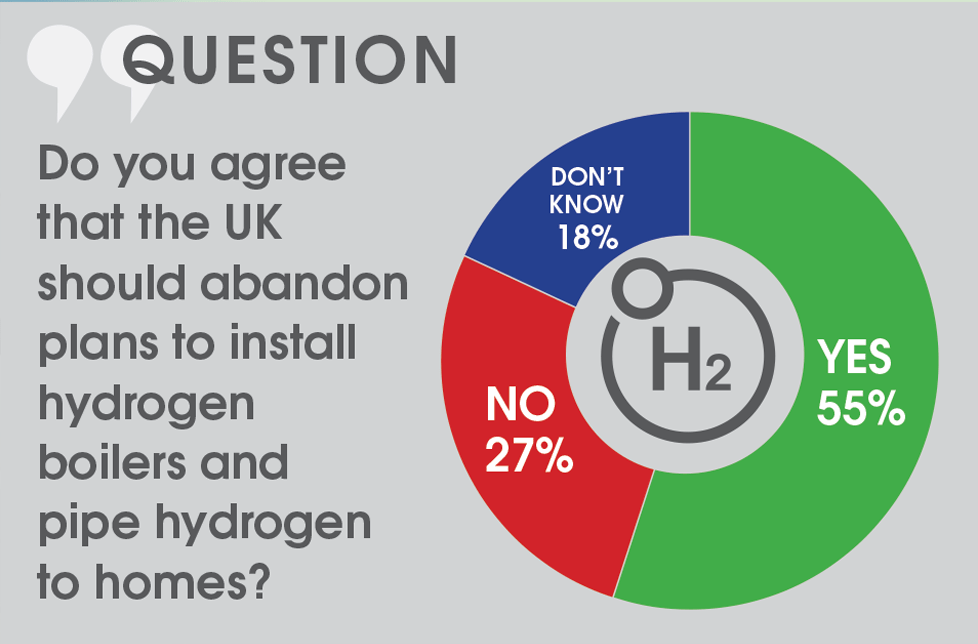
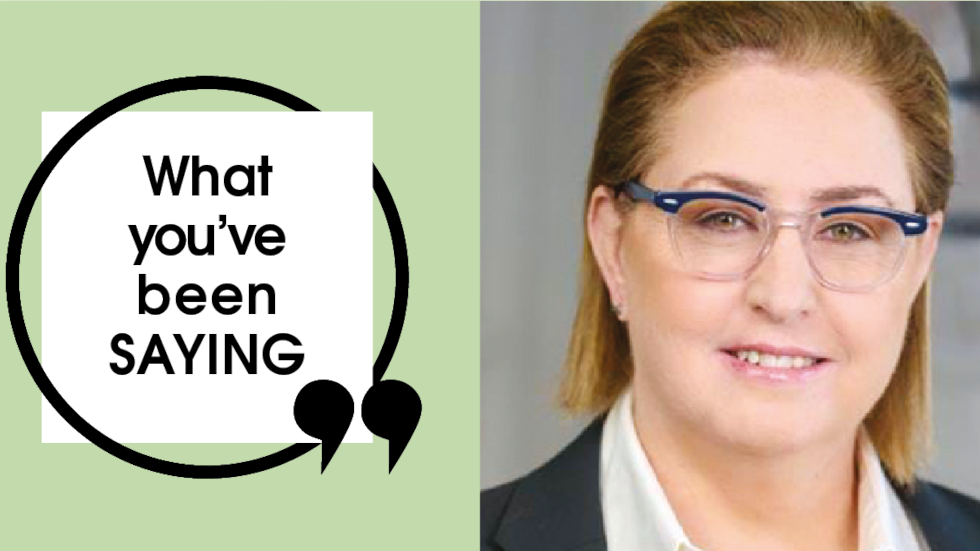
We are launching International Process Safety Week
Trish Kerin, director of the IChemE Safety Centre
DECEMBER 2024 marks the 40th anniversary of the Bhopal tragedy in which thousands of people were killed in the worst process safety event the world has seen. The fact the site remains abandoned and contaminated is an indictment of the chemical industry and engineers the world over. In the past, IChemE has reached out to the Indian government with a plea to allow the remediation, but this was sadly rebuffed (TCE 958, p32). We cannot let the memory of Bhopal and indeed all other catastrophic process safety events fade. We need to remember them so future generations can learn the lessons.
With this in mind, we are working with similar organisations from across the world to deliver an annual “International Process Safety Week”. The lead organisations involved include the Center for Chemical Process Safety, European Process Safety Centre, Mary Kay O’Connor Process Safety Center, the Fire and Blast Information Group and the IChemE Safety Centre, which is representing IChemE. This virtual event will take place from 2-6 December 2024, to coincide with the Bhopal anniversary. It will be the first time we join forces and is an exciting development in the process safety world. It aims to acknowledge the past but look to the future too.
Our ambition is for this initial collaboration to be the first of many future activities we can do together.
The initial date also corresponds with the 50th anniversary of the launch of IChemE’s Loss Prevention Bulletin (LPB), so we will be looking to work with LPB to showcase it as part of the activities. We will then continue to run an annual International Process Safety Week during the first week of December.
We hope that companies will plan internal activities around this week to raise process safety awareness in their organisations. So now is the time to save the date and start planning your in-company activities.
If you have any suggestions on the types of content or specific topics you would like to see delivered virtually, please reach out to the ISC safetycentre@icheme.org
Recent Editions
Catch up on the latest news, views and jobs from The Chemical Engineer. Below are the four latest issues. View a wider selection of the archive from within the Magazine section of this site.




